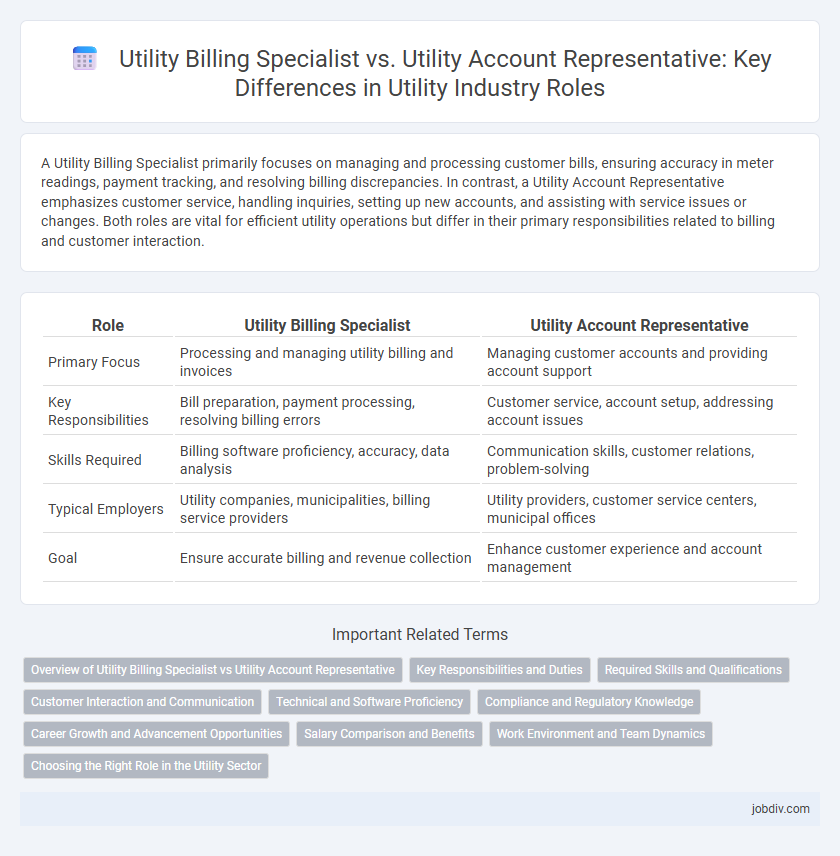A Utility Billing Specialist primarily focuses on managing and processing customer bills, ensuring accuracy in meter readings, payment tracking, and resolving billing discrepancies. In contrast, a Utility Account Representative emphasizes customer service, handling inquiries, setting up new accounts, and assisting with service issues or changes. Both roles are vital for efficient utility operations but differ in their primary responsibilities related to billing and customer interaction.
Table of Comparison
| Role | Utility Billing Specialist | Utility Account Representative |
|---|---|---|
| Primary Focus | Processing and managing utility billing and invoices | Managing customer accounts and providing account support |
| Key Responsibilities | Bill preparation, payment processing, resolving billing errors | Customer service, account setup, addressing account issues |
| Skills Required | Billing software proficiency, accuracy, data analysis | Communication skills, customer relations, problem-solving |
| Typical Employers | Utility companies, municipalities, billing service providers | Utility providers, customer service centers, municipal offices |
| Goal | Ensure accurate billing and revenue collection | Enhance customer experience and account management |
Overview of Utility Billing Specialist vs Utility Account Representative
Utility Billing Specialists handle the preparation, analysis, and processing of customer utility bills, ensuring accuracy in charges and resolving billing discrepancies. Utility Account Representatives focus on customer service aspects, managing inquiries, account setup, payment arrangements, and assisting customers with their utility accounts. Both roles are essential in utility management, with specialists concentrating on billing integrity and representatives prioritizing customer interaction and support.
Key Responsibilities and Duties
Utility Billing Specialists manage precise invoicing processes, ensuring accurate calculation of utility consumption, handling billing inquiries, and maintaining payment records. Utility Account Representatives focus on customer service, addressing account inquiries, resolving service issues, and assisting with account setup and adjustments. Both roles require strong communication skills and familiarity with utility billing systems, but Billing Specialists emphasize financial accuracy while Account Representatives prioritize customer relationship management.
Required Skills and Qualifications
Utility Billing Specialists require strong analytical skills, proficiency in billing software, and a thorough understanding of utility rate structures and regulations to accurately process and manage customer invoices. Utility Account Representatives need excellent communication abilities, problem-solving skills, and expertise in customer service practices to address account inquiries and resolve billing disputes effectively. Both roles demand attention to detail, familiarity with utility industry standards, and experience in data entry or account management systems.
Customer Interaction and Communication
A Utility Billing Specialist primarily handles detailed billing inquiries and resolves discrepancies by analyzing account usage and payment history, ensuring accurate financial transactions for customers. In contrast, a Utility Account Representative focuses on broader customer interaction, addressing account setup, service issues, and providing personalized support to enhance customer satisfaction. Both roles demand strong communication skills, but the billing specialist emphasizes data accuracy while the account representative prioritizes relationship management.
Technical and Software Proficiency
Utility Billing Specialists demonstrate advanced proficiency in billing software such as SAP and Oracle Utilities, enabling precise management of metering data and invoice generation. Utility Account Representatives often excel in customer relationship management platforms like Salesforce, focusing on account updates and service inquiries with technical accuracy. Both roles require familiarity with GIS mapping tools and smart grid technology but differ in software application emphasis--billing specialists prioritize financial systems, while account representatives leverage CRM and communication tools.
Compliance and Regulatory Knowledge
Utility Billing Specialists possess in-depth expertise in billing procedures and regulatory compliance standards essential for accurate invoicing and revenue assurance. Utility Account Representatives emphasize customer interaction but also maintain critical knowledge of regulatory requirements to address account issues and ensure compliance. Both roles require a strong understanding of utility regulations, though the Billing Specialist focuses more on compliance with billing laws, while the Account Representative balances compliance with customer service obligations.
Career Growth and Advancement Opportunities
Utility Billing Specialists often advance by gaining expertise in billing systems and regulatory compliance, leading to roles such as Billing Supervisors or Revenue Analysts. Utility Account Representatives typically progress by developing strong customer service and problem-solving skills, opening pathways to positions like Account Managers or Customer Service Supervisors. Both career paths offer opportunities to move into management roles within utility companies, with growth potential enhanced by certifications and experience in energy regulations.
Salary Comparison and Benefits
Utility Billing Specialists typically earn an average salary ranging from $40,000 to $55,000 annually, while Utility Account Representatives often receive slightly higher compensation, averaging between $45,000 and $60,000 per year. Benefits for both roles generally include health insurance, retirement plans, and paid time off, but Utility Account Representatives may have access to additional commission-based incentives or performance bonuses. Salary differences are influenced by job responsibilities, with Account Representatives handling customer relations and service inquiries, while Billing Specialists focus on invoice processing and payment collection.
Work Environment and Team Dynamics
Utility Billing Specialists typically work in office settings focused on data accuracy and billing processes, collaborating closely with finance and customer service teams. Utility Account Representatives engage directly with customers in call centers or field environments, emphasizing communication and problem-solving within a team-oriented atmosphere. Both roles require coordination with multiple departments but differ in interaction style and workspace dynamics.
Choosing the Right Role in the Utility Sector
Utility Billing Specialists primarily focus on managing accurate invoicing, payment processing, and resolving billing discrepancies, ensuring revenue flow within utility companies. Utility Account Representatives emphasize customer service by addressing account inquiries, assisting with service setup, and fostering positive client relationships. Selecting the right role depends on whether one prefers analytical billing tasks or direct customer interaction in the utility sector.
Utility Billing Specialist vs Utility Account Representative Infographic

 jobdiv.com
jobdiv.com